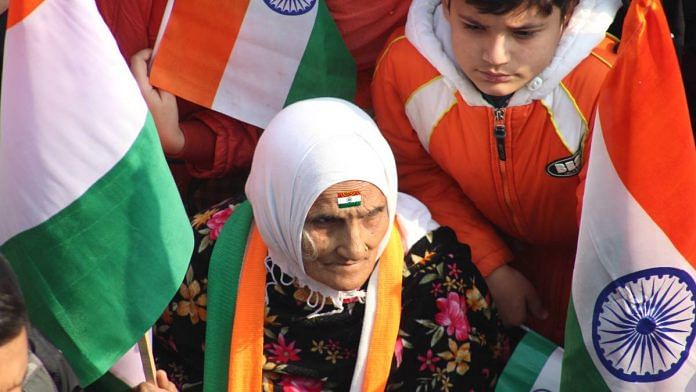New Delhi: Though Indians show an enthusiasm for religious tolerance, they prefer to keep their religious communities in segregated spheres in terms of marriage and residential areas, according to a new survey by US-based Pew Research Center.
Published on 29 June, the survey titled ‘Religion in India: Tolerance and Segregation’ found that 85 per cent of Hindus, 78 per cent of Muslims, 78 per cent of Christians, 81 per cent of Sikhs, 84 per cent of Buddhists and 83 per cent of Jains believe respecting other religions is very important to being ‘truly Indian’.
Some also shared similar religious beliefs. For instance, an identical percentage of Muslims and Hindus believed in karma (77 per cent). However, 66 per cent of Hindus and 64 per cent of Muslims saw each other as very different, while two-thirds of Jains and about half of Sikhs said they have a lot in common with Hindus.
This perception of difference between communities was reflected in traditions and habits like marriage, found the survey. It also found that Indians “express enthusiasm” for religious tolerance but preferred to “live together separately”.
Among the survey’s other major findings was that one in three Hindus did not want a Muslim as a neighbour, and over half of Hindus felt being a Hindu was important to being an Indian. Also, unlike Muslims or Sikhs, Hindus were more likely to say the partition was a ‘good thing’.
The survey, conducted in 17 languages, was based on 29,999 face-to-face interviews of Indian adults between 17 November 2019 and 23 March 2020 — before the pandemic. The sample consisted of 22,975 Hindus, 3,336 Muslims, 1,782 Sikhs, 1,011 Christians, 719 Buddhists, 109 Jains and 67 who identified as belonging to another religion or as religiously unaffiliated.
Also read: 93% Muslims view Hindus favourably, but only 65% Hindus view Muslims positively: Pew survey
One-in-three Hindus don’t want a Muslim neighbour
One-in-three Hindus (36 per cent) did not want a Muslim as a neighbour, it found. Meanwhile, 61 per cent of Jains said they were unwilling to accept a neighbour from at least one of the other religions — be them Muslim, Christian, Sikh, or Buddhist — and 54 per cent said they would not accept a Muslim neighbour.
Among respondents who were Jains, 92 per cent said they would accept a Hindu neighbour. About 78 per cent of Muslims and members of other religious minority communities also said they would be willing to live near a Hindu.
When it came to marriage, 67 per cent Hindus wanted to prevent inter-religious marriages of Hindu women and 65 per cent wanted to prevent the same for Hindu men, found the survey. Similarly, 80 per cent of Muslims said it was very important to stop Muslim women from marrying outside their religion, and 76 per cent felt the same about Muslim men.
For 74 per cent of Muslims, having access to the existing system of Islamic courts in addition to the secular court system was important.
Also read: India needs more and more inter-faith marriages, and laws need to facilitate that
Being Hindu important to Indian identity for many Hindus
The survey found that for 64 per cent of the Hindus surveyed, being “truly” Indian meant they were also Hindus, and 59 per cent linked the ‘Indian identity’ with the ability to speak Hindi.
It also found that Hindu BJP voters who linked national identity with religion and language were more inclined to support a religiously segregated India than other Hindu voters. However, 65 per cent of such Hindu BJP voters said religious diversity benefits India as opposed to 47 per cent of other Hindu voters.
“This finding suggests that for many Hindus, there is no contradiction between valuing religious diversity (at least in principle) and feeling that Hindus are somehow more authentically Indian than fellow citizens who follow other religions,” the survey noted.
Meanwhile, 95 per cent of the Muslim respondents said they were very proud to be Indian and 85 per cent agreed with the statement: “Indian people are not perfect, but Indian culture is superior to others.”
An identical percentage of Muslims and Hindus (65 per cent each) saw communal violence as a very big national problem.
The Partition sentiment
The survey found that while Sikhs and Muslims were more likely to say the Partition was a ‘bad thing’, Hindus were leaning in the opposite direction.
It found that 43 per cent of Hindus felt the Partition was beneficial for Hindu-Muslim relations while 37 per cent of them saw it as a ‘bad thing’. However, 48 per cent of Muslims said Partition hurt Hindu-Muslim relations and only 30 per cent said it was a ‘good thing’.
Among Sikhs, whose homeland of Punjab was split by the event, 66 per cent said Partition was a ‘bad thing’ for Hindu-Muslim relations.
(Edited by Manasa Mohan)
Also read: Riots changed Hindu-Muslim dynamics in NE Delhi. For some, it’s ‘hateful beyond repair’ now



